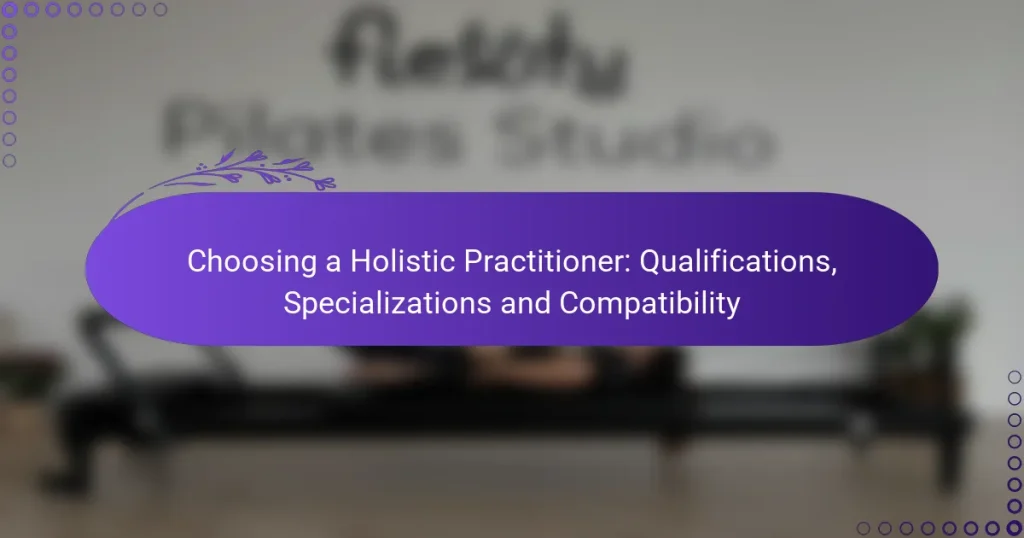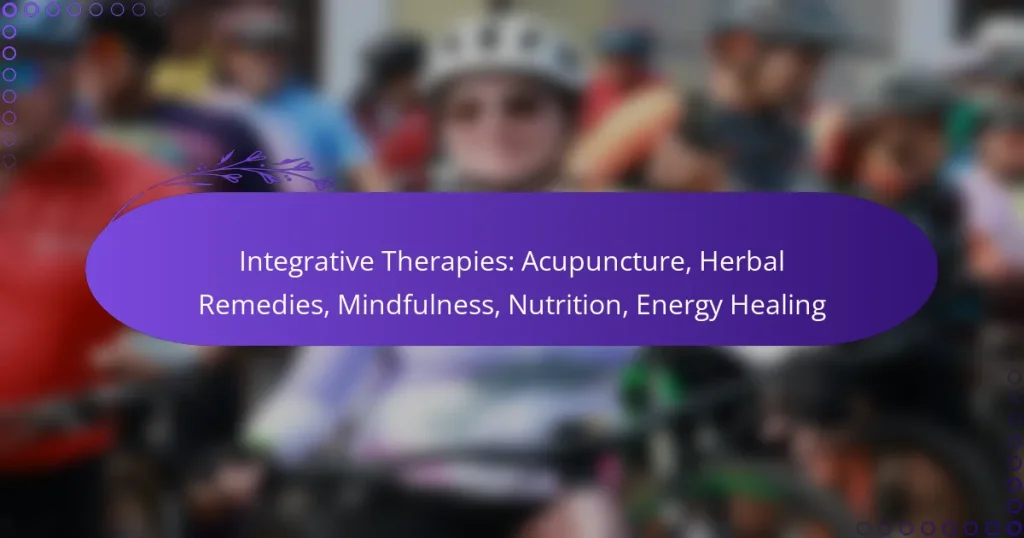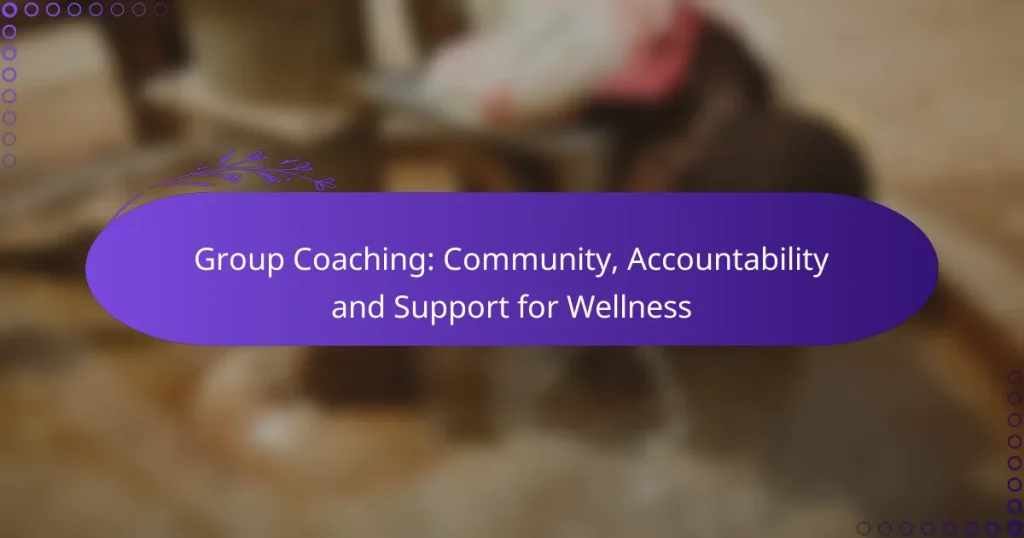Integrative approaches to holistic wellness emphasize the importance of treating the whole person—mind, body, and spirit—rather than merely addressing symptoms. By combining conventional medical practices with complementary therapies, these methods aim to enhance overall health and well-being, fostering a balanced lifestyle that nurtures all aspects of an individual.
Acupuncture: Techniques, Benefits and Holistic Health
Community Support: Impact, Resources and Engagement on Wellness Journey
Choosing a Holistic Practitioner: Qualifications, Specializations and Compatibility
Integrative Therapies: Acupuncture, Herbal Remedies, Mindfulness, Nutrition, Energy Healing
Group Coaching: Community, Accountability and Support for Wellness
What are integrative approaches to holistic wellness?
Integrative approaches to holistic wellness focus on treating the whole person—mind, body, and spirit—rather than just symptoms. These methods combine conventional medical practices with complementary therapies to promote overall health and well-being.
Mind-body techniques
Mind-body techniques emphasize the connection between mental and physical health. Practices like meditation, yoga, and tai chi can reduce stress, enhance emotional well-being, and improve physical health. Regular engagement in these activities can lead to better sleep, lower blood pressure, and improved immune function.
To incorporate mind-body techniques, start with short daily sessions of meditation or gentle yoga. Aim for 10-20 minutes each day, gradually increasing duration as you become more comfortable.
Nutritional therapy
Nutritional therapy focuses on using food and dietary changes to support health and prevent illness. This approach emphasizes whole foods, balanced macronutrients, and specific dietary patterns tailored to individual needs. For example, a diet rich in fruits, vegetables, lean proteins, and healthy fats can enhance energy levels and support immune function.
Consider working with a registered dietitian to create a personalized nutrition plan. Aim to include a variety of colors on your plate, which often indicates a range of nutrients.
Energy healing practices
Energy healing practices, such as Reiki and acupuncture, aim to balance the body’s energy systems. These methods can help alleviate pain, reduce stress, and promote relaxation. They often involve gentle touch or the application of needles to specific points on the body to facilitate energy flow.
When exploring energy healing, seek practitioners with proper certifications and experience. Sessions typically last 30-60 minutes and can be done weekly or bi-weekly, depending on individual needs.
Physical therapies
Physical therapies include a range of treatments designed to improve mobility and reduce pain. Common modalities are physical therapy, chiropractic care, and massage therapy. Each method can address specific issues, such as injury rehabilitation or chronic pain management.
Consult with a healthcare provider to determine the most suitable physical therapy for your condition. Regular sessions, often once or twice a week, can lead to significant improvements in function and comfort.
Psychological counseling
Psychological counseling provides support for mental health issues through various therapeutic approaches, including cognitive-behavioral therapy (CBT) and mindfulness-based therapy. These methods can help individuals manage stress, anxiety, and depression, promoting overall wellness.
Consider seeking a licensed therapist or counselor who specializes in your area of concern. Regular sessions, typically weekly or bi-weekly, can foster personal growth and emotional resilience.
How can I implement holistic wellness in my daily life?
Implementing holistic wellness in daily life involves integrating practices that nurture the mind, body, and spirit. Focus on mindfulness, nutrition, physical activity, and community support to create a balanced lifestyle.
Daily mindfulness practices
Daily mindfulness practices can significantly enhance your overall well-being by promoting awareness and reducing stress. Consider incorporating techniques such as meditation, deep breathing exercises, or mindful walking into your routine.
Start with just a few minutes each day, gradually increasing the duration as you become more comfortable. Apps like Headspace or Calm can provide guided sessions to help you stay on track.
Balanced meal planning
Balanced meal planning is essential for maintaining physical health and energy levels. Aim to include a variety of whole foods, such as fruits, vegetables, whole grains, and lean proteins in your meals.
Consider preparing meals in advance to avoid unhealthy choices during busy days. A simple guideline is to fill half your plate with vegetables, a quarter with protein, and a quarter with whole grains.
Regular physical activity
Regular physical activity is crucial for holistic wellness, as it boosts mood and improves physical health. Aim for at least 150 minutes of moderate aerobic activity each week, such as brisk walking or cycling.
Incorporate strength training exercises at least twice a week to enhance muscle health. Find activities you enjoy, whether it’s dancing, yoga, or team sports, to make it easier to stay consistent.
Community support groups
Community support groups can provide valuable emotional and social support, enhancing your holistic wellness journey. Look for local or online groups that align with your interests or challenges, such as wellness workshops or fitness classes.
Engaging with others who share similar goals can foster motivation and accountability. Consider participating in community events or forums to expand your network and find encouragement.
What are the benefits of holistic wellness?
Holistic wellness offers a comprehensive approach to health by integrating physical, mental, and emotional well-being. This method promotes balance and harmony, leading to improved quality of life and overall satisfaction.
Improved mental health
Holistic wellness practices, such as mindfulness and meditation, can significantly enhance mental health by reducing symptoms of anxiety and depression. Engaging in activities that promote relaxation and self-awareness helps individuals develop a more positive mindset.
Incorporating techniques like journaling or therapy can further support mental clarity and emotional stability. These practices encourage individuals to explore their thoughts and feelings, leading to greater self-understanding and resilience.
Enhanced physical health
Holistic wellness emphasizes the importance of nutrition, exercise, and sleep in maintaining physical health. A balanced diet rich in whole foods, regular physical activity, and adequate rest are crucial components of this approach.
For example, integrating yoga or tai chi can improve flexibility and strength while also promoting relaxation. Regular check-ups and preventive care are also essential to address potential health issues before they escalate.
Increased emotional resilience
Holistic wellness fosters emotional resilience by encouraging individuals to develop coping strategies and a strong support network. Engaging in community activities or support groups can help build connections and provide a sense of belonging.
Practices such as gratitude exercises and positive affirmations can also enhance emotional strength. These techniques help individuals focus on the positive aspects of their lives, making it easier to navigate challenges.
Better stress management
Effective stress management is a core benefit of holistic wellness, which utilizes various techniques to help individuals cope with daily pressures. Practices like deep breathing, meditation, and physical activity can lower stress levels and promote relaxation.
Creating a balanced routine that includes time for self-care is essential. Setting boundaries and prioritizing tasks can also prevent overwhelm and enhance overall well-being.
What are the costs associated with holistic wellness services?
The costs of holistic wellness services can vary widely based on the type of service, location, and provider expertise. Generally, individuals should expect to invest in multiple areas, including therapy sessions, nutritional consultations, and wellness retreats.
Average therapy session fees
Therapy session fees in the holistic wellness sector typically range from $50 to $200 per hour. Factors influencing these costs include the therapist’s qualifications, the session’s length, and the specific modalities used, such as acupuncture or massage therapy.
Many practitioners offer sliding scale fees based on income, which can make therapy more accessible. It’s advisable to inquire about any available discounts or package deals for multiple sessions.
Costs of nutritional consultations
Nutritional consultations usually cost between $75 and $150 for an initial session, with follow-up appointments often priced lower. These consultations may include personalized meal planning and dietary assessments tailored to individual health goals.
Some practitioners may offer packages that include several sessions at a reduced rate. Always check if your health insurance covers any part of these services, as some plans may reimburse for nutritional counseling.
Pricing for wellness retreats
Wellness retreats can vary significantly in price, typically ranging from a few hundred to several thousand dollars depending on the duration, location, and included amenities. Short weekend retreats may start around $300, while week-long immersive experiences can exceed $2,000.
When considering a retreat, look for what is included in the price, such as accommodations, meals, and activities. Early booking discounts and group rates can also provide savings, so it’s wise to explore these options before committing.
How do I choose the right holistic wellness practitioner?
Choosing the right holistic wellness practitioner involves evaluating their qualifications, client feedback, and your personal compatibility with their approach. This ensures that you receive effective and personalized care tailored to your needs.
Check credentials and experience
Start by verifying the practitioner’s credentials and relevant experience. Look for certifications from recognized organizations in holistic health, such as the National Certification Commission for Acupuncture and Oriental Medicine (NCCAOM) or similar bodies in your country.
Experience can vary significantly; consider practitioners with at least a few years of practice in their specialty. This background often translates to better insights and techniques for addressing your specific wellness goals.
Read client testimonials
Client testimonials provide valuable insights into a practitioner’s effectiveness and approach. Look for reviews on their website, social media, or independent platforms to gauge overall satisfaction and outcomes.
Pay attention to recurring themes in feedback, such as communication style, treatment effectiveness, and the practitioner’s ability to create a comfortable environment. This can help you assess whether their style aligns with your expectations.
Assess compatibility and approach
Compatibility with your holistic wellness practitioner is crucial for a successful therapeutic relationship. Consider scheduling an initial consultation to discuss your goals and observe their communication style and approach to care.
Different practitioners may emphasize various modalities, such as acupuncture, nutrition, or mindfulness. Ensure their methods resonate with you and fit your personal beliefs and preferences to foster a productive partnership in your wellness journey.





